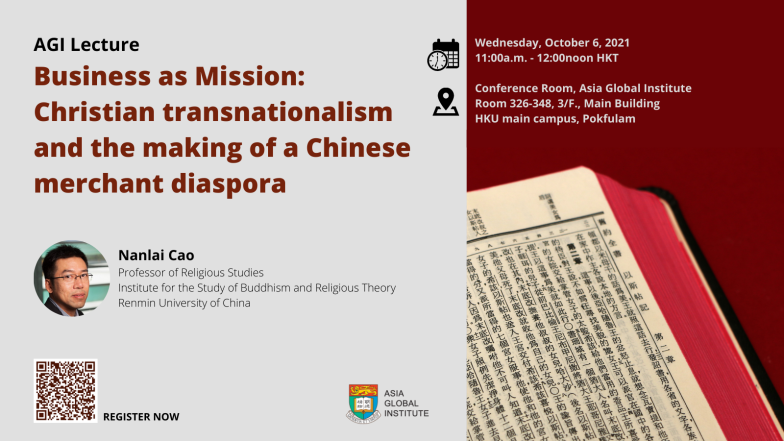
Wednesday, October 6, 2021
Venue: Conference Room, Asia Global Institute Room 326-348, 3/F., Main Building HKU main campus, Pokfulam
Nanlai Cao
AGI Lectures
Enquiry: T: +852 3917 1297 | E: agimail@hku.hk
In contemporary China, state-driven secularization has constituted a deliberate disregard for the role of religion in economic modernization in both official and popular discourse. Professor Nanlai Cao from Institute for the Study of Buddhism and Religious Theory of Renmin University of China challenges this secularist bias by highlighting the economic culture of Christianity in the current context of China’s business outreach. Drawing on his decade-long anthropological fieldwork conducted in China and the Chinese diaspora in Europe, Professor Cao explores the role the Protestant churches in the socioeconomic and moral lives of diasporic Chinese against the backdrop of European secularity.
In this AGI Lecture, Professor Cao will explain in detail how a group of Chinese merchants and traders, while being haunted by memories and everyday realities of migrants without legal status, managed to establish an institutional niche for their diasporic businesses and religious practices. He will also explore the accompanied structural convergences between their religious and business activities based on shared histories of marginalization and subjugation of these migrants in the context of state-produced legality and explain why this large mercantile group embarked on this path of transnational business life through Christianity rather than indigenous religions, folk networks, or professional associations. He argues that the study of religion and trade, in recognizing the agentic role of religion in economic globalization and modernity, will develop a fuller understanding of how China’s ambitious global business outreach operates.
Thank you for attending!
Professor of Religious Studies, Institute for the Study of Buddhism and Religious Theory, Renmin University of China

Room 326-348, Main Building
The University of Hong Kong
Pokfulam, Hong Kong